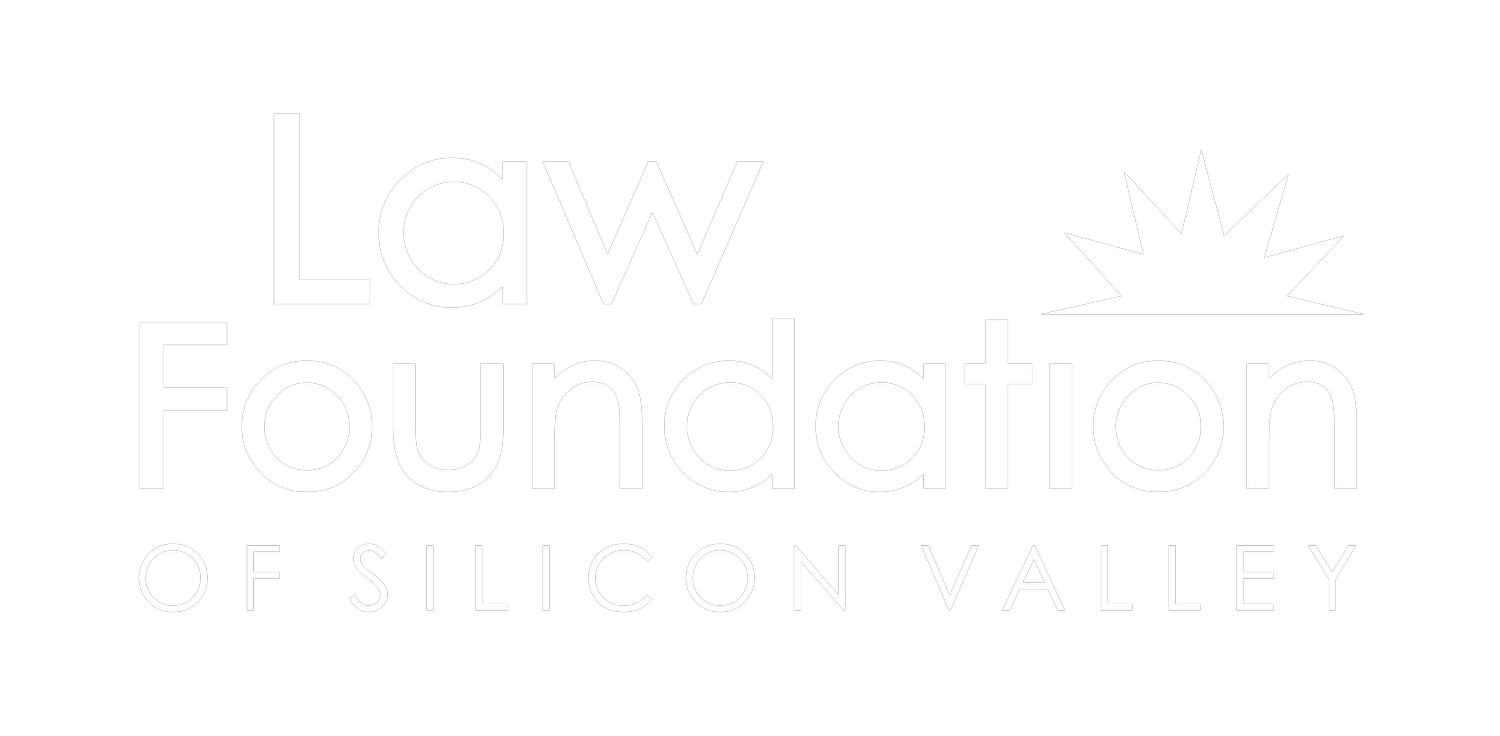Dear Friends,
First, my continued wishes for your health and safety during this challenging time.
My colleagues and I continue to see firsthand the dire circumstances many of our clients are facing. From illness to job loss, the impacts of the COVID-19 pandemic are still reverberating through our community. An article published in the Mercury News in July revealed that Black and Latinx women in California have lost work at three times the rate of white men. As each month passes, the situation worsens.
Still, I remain hopeful. We can make holistic and transformative change that reflects our value that every human being deserves to be treated with dignity. Reimagining safety in our cities, rebuilding systems with equity at their center, and redistributing wealth were until recently obscure concepts. Today they are being discussed at all levels, by policymakers and in regular conversation.
I also remain hopeful because of our supporters. Many of you have stepped up during this unprecedented time to provide critical funding to help our community through crisis. Foundations, in particular, have taken an active role in responding to the crisis. On behalf of the Law Foundation, I want to express my deepest gratitude to MAC Viva Glam, May & Stanley Smith Charitable Trust, Silicon Valley Community Foundation, Sobrato Family Foundation, Sunlight Giving and Wells Fargo for awarding the Law Foundation with emergency COVID-19 funding. This support is allowing us to continue offering responsive and innovative services to meet the evolving needs of our community.
Lastly, I would like to personally thank all of our 2020 Annual Partners, including Cooley, DLA Piper, Fenwick & West, Goodwin Procter, Orrick, Herrington & Sutcliffe, Silicon Valley Bank, and Wilson Sonsini Goodrich & Rosati. It has been inspiring to witness your engagement during this time, despite the very real challenges we all are facing.
In community,
Alison Brunner, Esq.
CEO
NEWS
"Eviction Time-Bomb" - COVID-19 Effects Could Push 43,000 Families Out of Their Homes After Eviction Moratorium Ends
COVID-19 has cost thousands of people in Santa Clara County - especially Black and Latinx people working in industries that pay low wages - the jobs and income they depend on to make rent. Over 200,000 working people here filed claims for Unemployment Insurance (UI) or Pandemic Unemployment Assistance (PUA) just between March 15 and May 30, 2020.
Thousands more, including many of the estimated 95,000 undocumented workers in the county, have likely been ineligible or unable to access programs to replace their income.
While Santa Clara County's eviction moratorium means landlords cannot evict people during the pandemic, renters must still pay back any missed rent within one year after the county ends the moratorium. That bill could run roughly $7,000 for three months without income for the average renter household.
This new report examines who's most at risk of eviction in Santa Clara County after the current moratorium ends and back rent comes due. It finds:
An estimated 43,000 renter households are at the highest risk of eviction, primarily undocumented workers and others who aren't receiving unemployment or other income replacement. That's roughly 16 times the typical number of evictions filed in a whole year.
If just 10%-18% of those folks are evicted and end up homeless (in line with past research), that could double or triple the County's homeless population.
As a consequence of racist housing and economic systems, those facing eviction are disproportionately likely to be Black and Latinx, women-headed households, and families with young children.
To avoid this eviction time bomb, policymakers must:
Permanently prohibit evictions for tenants who are unable to pay rent during the state of emergency due to loss of income from COVID-19.
Ensure every tenant facing eviction has access to legal assistance, education, and services to prevent displacement and homelessness.
Provide tenants most at-risk with relief to cancel rent debt and prevent evictions.
HOW CAN YOU HELP NOW?
Write to your Congressperson supporting the Rent and Mortgage Cancellation Act of 2020. This bill would eliminate all rent and mortgage payments during the COVID-19 national emergency and provide critical relief for tenants and landlords.
Write to local Assembly members supporting Assembly Bill 1436, which would prevent the eviction of renters unable to pay rent during the COVID-19 emergency period, keeping them housed while still allowing landlords to collect rent owed. Find and contact your Assembly member.
We need the Board of Supervisors to extend the eviction moratorium throughout the emergency, and permanently prohibit landlords from evicting tenants who are unable to repay back rent due to loss of income from COVID-19. Can you join us in urging the Board of Supervisors to stop the eviction time bomb?
Donate to the Law Foundation to support our response to the eviction surge. The Law Foundation estimates less than 4% of tenants have an attorney to represent them in eviction court. This unequal balance of power in favor of landlords means most tenants facing eviction don't have a fighting chance of staying housed, regardless of the facts of their case.
Volunteer. Partner with us to address this crisis. Send an email to probono.info@lawfoundation.org to request more information on current and upcoming volunteer opportunities.
IN THE NEWS
Children Need Support & Resources, Not Criminalization
The Law Foundation of Silicon Valley is proud to stand with the Alum Rock Union and East Side Union High school districts in their recent decisions to end their contracts with the San Jose Police Department. Both boards of education voted unanimously on June 25 to end the contracts.
Research shows that students of color and children with special needs are disproportionately impacted by police presence at schools. Members of the Law Foundation's Children & Youth program represent students with disabilities, some as young as elementary school age, who have suffered when police were called by school officials to their school to deal with behavioral issues. This practice only serves to traumatize young children and make them more afraid of attending school at all.
Law Foundation attorney Julia Souza commented during the Alum Rock board meeting about the importance of supporting children and families by removing police from schools.
"Cutting the contract is a good start - but it's just that," Souza said about the district's agreement with the San Jose Police Department. "ARUSD needs to continue implementing wholesale reform of all school interactions with police, especially when staff are calling the police for children with special needs." Read more in The Mercury News.
ADVOCACY
Tell Your Legislator: Commit to Equity
The Law Foundation supports "Commit to Equity," a statewide campaign of frontline workers, teachers, seniors, environmentalists, and advocates for social and racial justice. As Californians are struggling under the pressures of the COVID-19 pandemic, we are demanding legislators commit to investing in our communities. Our legislators have a responsibility to ensure that everyone pays their fair share in taxes and that communities of color do not disproportionately bear the burden of the pandemic and its subsequent economic consequences. Take action and demand California Legislators fund bold changes to our budget to invest in our communities and our future.
In Case You Missed It
Photo by Luke Johnson
Advocating for Racial Justice at the City and County-Level
Our community has made it clear: We urgently need elected officials to address police brutality and structural racism. The Law Foundation and many other community organizations are leading the way to push for city and county-level focus on funding to prioritize racial equity. Law Foundation CEO Alison Brunner stressed the importance of "transforming and humanizing" crisis response in a recent San Jose Spotlight article.
Standing Up for Nonprofit Funding
The nonprofit sector, including the Law Foundation, relies on government funding - local, state, and federal. In June, the nonprofit sector faced significant cuts in California's budget. We joined the community's efforts in calling for legislative leaders to keep funding intact for the critical services many Californians rely on. The initial budget reduction was decreased but county funding will still take a $162 million hit. These cuts will take their toll on the Law Foundation and other important services. You can help offset this impact by donating locally. Visit www.lawfoundation.org/support to make a tax-deductible donation.
Community Feedback on Diridon Station Area
As the sole legal aid provider on the Diridon Station Area Advisory Group, which is a coalition of 38 member organizations appointed by San Jose City Council to provide input on development of the Diridon Station Area, the Law Foundation is at the table advocating for low-income communities of color. We encourage community members to provide their feedback on the future of the Diridon Station Area, including Google's proposed development project.
Click here to take the survey. | Nos gustaría que brinden sus comentarios sobre el futuro del área de la estación de Diridon, incluyendo el proyecto de desarrollo propuesto por Google.







![ICYMI - Diridon Feedback [Converted].png](https://images.squarespace-cdn.com/content/v1/577c8338bebafbe36dfc1691/1595540640030-EC34NJ9RBB5TWMKD0XDH/ICYMI+-+Diridon+Feedback+%5BConverted%5D.png)












